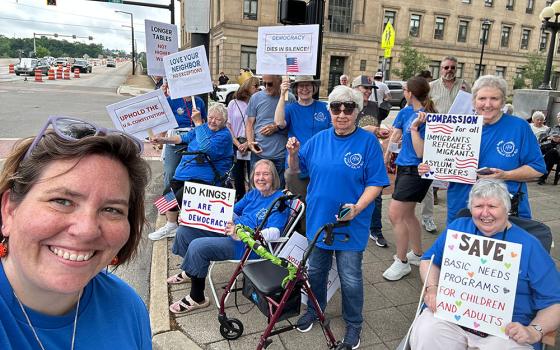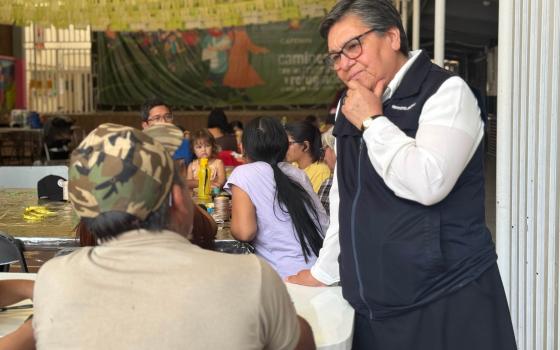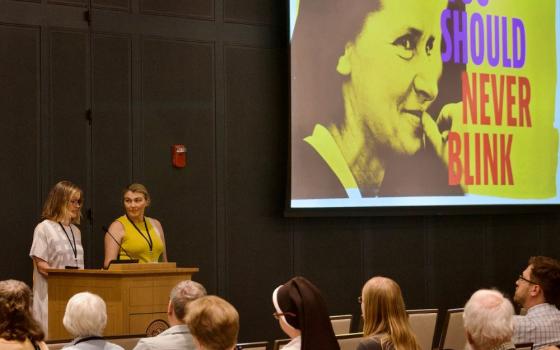Srs. Georgina Chepkemoi, left, and Augustine Atieno play with children at the Rang'ala Baby Home in Kenya. The home currently has 42 children ages 2 months to 8 years. (Lourine Oluoch)
For many families the birth of a child is a happy time, and it should have been for Michael Ogolla, a resident of this village in western Kenya, when his wife gave birth to twin boys in April 2010.
Instead, it became a moment of sorrow. They lost one of the twins within the first week. Soon after, his wife, who had undergone a cesarean section and had been given a clean bill of health, was readmitted to the hospital. She did not make it back home and died, leaving behind a barely 2-week-old son, Meshack Otieno.
"I took her back to hospital but all of a sudden she passed away," said Ogolla, sadly recalling his confusion at the sudden turn of events. "When I asked the doctors what had happened, they told me she had anemia. She had lost a lot of blood after childbirth."
Ogolla was at a loss. He had two other children to take care of, 3- and 6-year-old girls, but it was the infant that worried him the most. Having lost the first twin, he feared that he would lose this one, too. He did not trust himself to take good care of the baby.
"I had a hard time getting somebody to look after the child," he said. "I couldn't trust anyone in my family to be responsible enough to look after the newborn."
Advertisement
After consultations and a lot of soul searching, he decided to take his infant son to Rang'ala Baby Home. The home is run by six Franciscan Sisters of St. Joseph, along with several nurses. The babies and toddlers who stay here are either orphans or children whose parents have died from HIV/AIDS. In some cases the babies themselves have HIV.
The sisters agreed to take in Meshack after Ogolla produced legal documents confirming that the mother's child had died and he was the father of the child, he said.
"The sisters took good care of my child," said Ogolla. "They are well trained to take care of little children. Babies staying at the home are able to access basic needs including health care."
Today, Meshack is a strapping young lad of 10 years who is in grade four at a local primary school in Rang'ala. He exited the home in 2013 when he was 3-and-a-half years old and now lives with his father and sisters.
Michael Ogolla, right, and his 10-year-old son, Meshack Otieno, who was admitted to Rang'ala Baby Home when he was 2 weeks old. Ogolla says the home took good care of his child after his wife died. (Lourine Oluoch)
However, he hasn't forgotten his roots.
"I always go back to the home to visit the sisters and meet the other children," said Meshack. "I like playing with the children at the home when I visit. Sometimes my father buys snacks like biscuits and sweets, which I take to them."
The East African country has a high maternal mortality rate due to difficulties in pregnancy or childbirth, with 362 deaths in every 100,000 live births from 2007 to 2014, according to the 2014 Kenya Demographic and Health Survey. However, in the most recent statistics from the U.N. Maternal Mortality Estimation Inter-Agency Group, Kenya is one of 20-some countries with a very high ratio of maternal deaths. The data covered 1990 to 2015 and indicated Kenya had 510 maternal deaths for every 100,000 live births.
In Nyanza region, where the home is located, the maternal mortalities were recorded at 82 deaths per 1,000 live births, the worst in the country, according to the Kenya Demographic and Health Survey. The survey indicates that hypertension and hemorrhage are common direct causes of death among pregnant women, and HIV and complications of unsafe abortions are common indirect causes of death.
Sr. Georgina Chepkemoi plays with a child at Rang'ala Baby Home in western Kenya. The children are divided into groups according to their ages. (Lourine Oluoch)
The high number of maternal deaths in the region prompted the sisters to set up Rang'ala Baby Home to help children who had lost their mothers make it to their first birthday. The home was established in 1939 by the Franciscan Missionary Sisters of St. Joseph. They later handed the institution to the Franciscan Sisters of St. Joseph, a local congregation, to continue with the mission.
Sr. Georgina Chepkemoi explains that the first few months are the hardest for the caretakers, especially if a child is brought into the home when they are just days old.
The home takes care of children between the ages of 1 day and 6 years. Currently it has 42 children, ranging in age from 2 months to 8 years old. The home has provided relief to widowers and guardians, who suddenly find themselves in charge of newborns.
"You don't sleep, you are just like a mother who has given birth," said Chepkemoi, a social worker at the home. "They cry day and night, you have to feed them, you have to change them, and you have to give them that warmth. You have to be around them all the time for the first one and a half months."
Anne Otieno, a resident of Rang'ala, admits that it was not easy trying to take care of her nephew, Emmanuel Ligala, when her brother and his wife died in a road accident in 2014.
"He [Emmanuel] was 4 months old and I had a child of the same age," said the 37-year-old Atieno, a mother of one. "I could not take care of both children. We thought he could remain under the care of his grandmother, but at some point he became very sick and we feared losing him. We took him to the sisters, who could provide better care. We are happy that we got him back healthy after four years."
From left are Sr. Mary Okome, the director of Rang'ala Baby Home; her assistant Sr. Georgina Chepkemoi, who is a social worker, and Sr. Augustine Atieno, who is in charge of the kitchen. The Franciscan Sisters of St. Joseph have been running the home since 1968. (Lourine Oluoch)
Sr. Mary Okome, the director at the home, said that sometimes the newborns need extra special care, especially if they come in with health complications or are underweight, adding that currently the home has some children who are HIV positive, one who has tuberculosis, and one with an enlarged heart.
"The normal weight of a newborn is 2.5 kilograms [5.5 pounds] so, if a child is brought here with a lower weight, they have to be put in an incubator till they attain the required weight. Such children need special attention and care," she said.
Okome also attributes the high maternal deaths to high poverty levels and diseases in the region. "Here, a mother visits the clinic and is advised to take a balanced diet but she cannot even afford to buy food," she said. "Diseases like malaria and HIV/AIDS also contribute to the deaths."
She notes that apart from children who are taken to the home by their families, others get direct referrals from the hospitals. Abandoned or neglected children have also found their way to the home with the help of children's rights organizations or government agencies.
"We have several children who were directly referred to us from the hospital," said Okome. "Most of their mothers delivered through cesarean section and developed some complications and died afterwards."
Sr. Georgina Chepkemoi feeds one of the children at the Rang'ala Baby Home. (Lourine Oluoch)
At the home the children are divided into four age groups, each with a designated house mother. At 3-and-a-half years old, the children are ready to rejoin their families. Those who do not have a home are allowed to stay and wait for fostering or adoption.
Okome said that one of the biggest challenges the home is facing is funding. Just like many church institutions in Africa that heavily relied on funding from the West, the donors are withdrawing, leaving the home with big funding gaps, she said. With the aid dwindling, the sisters have come up with projects such as farming fish, dairy cattle, chickens and rabbits and a vegetable garden that help sustain the home.
It is an interesting life for these sisters who probably thought they had done away with child rearing when they became Catholic nuns. The home has literally turned them into mothers of not one or two, but 42 children.
"I feel happy when I give them love because I am doing this work for God," said Okome. "I feel proud when I see them growing and I see them being discharged from the home when they are well and are strong."
"I'm happy to be with the children," added Chepkemoi. "As a sister you are open to do the will of God. You can be assigned to do anything and you do it with a lot of love. With time, you get attached to the children and they also get used to you."
[Lourine Oluoch is a freelance journalist based in Nairobi, Kenya.]






